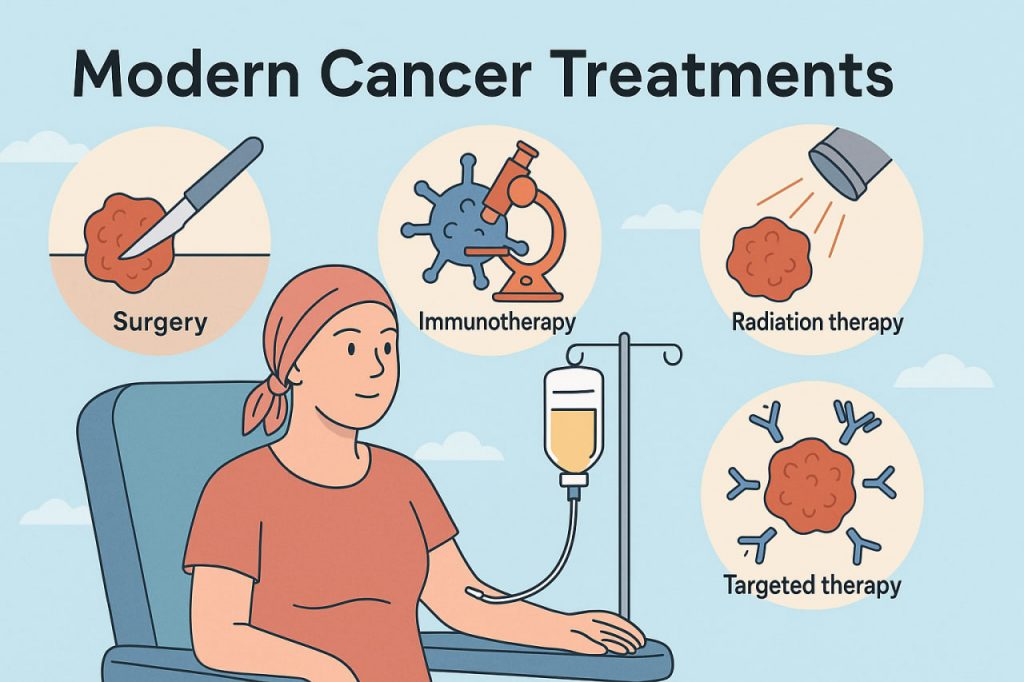Cancer is a complex group of diseases characterized by the uncontrolled growth of abnormal cells. While a cancer diagnosis once meant very limited treatment options, today’s modern cancer therapies are more precise, less invasive, and increasingly effective. Thanks to scientific breakthroughs, many forms of cancer can now be managed or even cured—especially when detected early.
How Cancer Treatments Have Evolved
In the past, most cancer treatments were generalized approaches—such as surgery, chemotherapy, and radiation—designed to attack fast-growing cells. While still widely used, these treatments often affected healthy tissue and caused significant side effects.
Modern treatment strategies now aim for targeted precision, minimizing damage to healthy cells and improving patient outcomes. Key innovations include immunotherapy, targeted therapy, and personalized medicine.
Surgery, Chemotherapy, and Radiation: Still Vital
These traditional methods remain central in many treatment plans:
- Surgery is used to remove solid tumors or affected tissues. It’s often the first step when cancer is localized.
- Chemotherapy involves powerful drugs that kill rapidly dividing cells. It can be systemic (affecting the whole body) or localized.
- Radiation therapy uses high-energy rays to damage or kill cancer cells at a specific site.
Despite their age, these tools continue to save lives—especially when used in combination with newer therapies.
Immunotherapy: Using the Body’s Defenses
Immunotherapy activates or enhances the body’s immune system to fight cancer. It helps the body recognize cancer cells as threats and attack them.
Types include:
- Checkpoint inhibitors – remove the “brakes” from immune cells so they can fight cancer
- CAR T-cell therapy – genetically modifies a patient’s own immune cells to target cancer cells
- Cancer vaccines – help the body build immunity against specific cancers
Immunotherapy has shown remarkable results in some cancers that were previously very difficult to treat, like melanoma and certain blood cancers.
Targeted Therapy: Attacking Cancer at Its Source
Unlike chemotherapy, which affects all rapidly growing cells, targeted therapy focuses on specific molecules involved in cancer growth.
These drugs are designed to:
- Block signals that tell cancer cells to grow
- Cut off blood supply to tumors
- Disrupt the cancer cell’s internal functions
Targeted treatments are often based on the genetic profile of the tumor, making them more precise and less toxic than conventional therapies.
Hormone Therapy and Bone Marrow Transplants
Some cancers, like breast and prostate cancer, rely on hormones to grow. Hormone therapy blocks or lowers the body’s hormone levels to slow or stop cancer.
Bone marrow transplants, also called stem cell transplants, are used to replace damaged bone marrow in cancers like leukemia. This can restore the body’s ability to make healthy blood cells after intense treatment.
Personalized and Precision Medicine
With advancements in genetic testing, doctors can now tailor treatments based on a person’s DNA and the genetic makeup of their tumor. This allows for:
- More accurate diagnosis
- Prediction of how well a treatment will work
- Fewer side effects and better quality of life
This approach is revolutionizing how doctors treat cancer—moving from one-size-fits-all to customized care.
Future Frontiers: Nanotechnology and AI
Emerging technologies offer hope for even better outcomes:
- Nanotechnology may deliver drugs directly to tumors
- Artificial Intelligence (AI) helps in early diagnosis and predicting treatment responses
- Gene editing (like CRISPR) could repair faulty DNA linked to cancer in the future
These experimental methods are still under research but show great promise.
Glossary
- Immunotherapy – Treatment that boosts the immune system to fight cancer.
- Targeted therapy – Drugs designed to attack specific molecules in cancer cells.
- CAR T-cell therapy – A form of gene therapy using modified immune cells.
- Checkpoint inhibitors – Medications that help immune cells recognize and destroy cancer.
- Precision medicine – Customized treatment based on a patient’s genetics.


